广州市小学英语总复习资料
广州市小学英语总复习资料
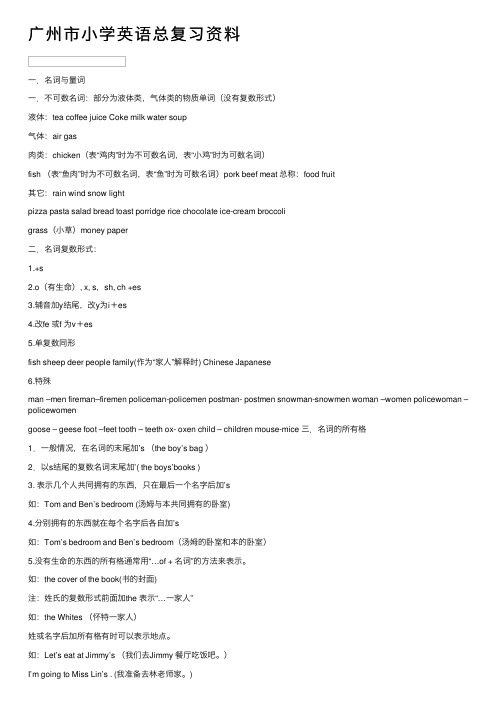
⼴州市⼩学英语总复习资料⼀.名词与量词⼀.不可数名词:部分为液体类,⽓体类的物质单词(没有复数形式)液体:tea coffee juice Coke milk water soup⽓体:air gas⾁类:chicken(表“鸡⾁”时为不可数名词,表“⼩鸡”时为可数名词)fish (表“鱼⾁”时为不可数名词,表“鱼”时为可数名词)pork beef meat 总称:food fruit其它:rain wind snow lightpizza pasta salad bread toast porridge rice chocolate ice-cream broccoligrass(⼩草)money paper⼆.名词复数形式:1.+s2.o(有⽣命), x, s,sh, ch +es3.辅⾳加y结尾,改y为i+es4.改fe 或f 为v+es5.单复数同形fish sheep deer people family(作为“家⼈”解释时) Chinese Japanese6.特殊man –men fireman–firemen policeman-policemen postman- postmen snowman-snowmen woman –women policewoman –policewomengoose – geese foot –feet tooth – teeth ox- oxen child – children mouse-mice 三.名词的所有格1.⼀般情况,在名词的末尾加’s (the boy’s bag )2.以s结尾的复数名词末尾加’( the boys’books )3. 表⽰⼏个⼈共同拥有的东西,只在最后⼀个名字后加’s如:Tom and Ben’s bedroom (汤姆与本共同拥有的卧室)4.分别拥有的东西就在每个名字后各⾃加’s如:Tom’s bedroom and Ben’s bedroom(汤姆的卧室和本的卧室)5.没有⽣命的东西的所有格通常⽤“…of + 名词”的⽅法来表⽰。
广州版小学英语四年级(上册)英语全册复习资料全
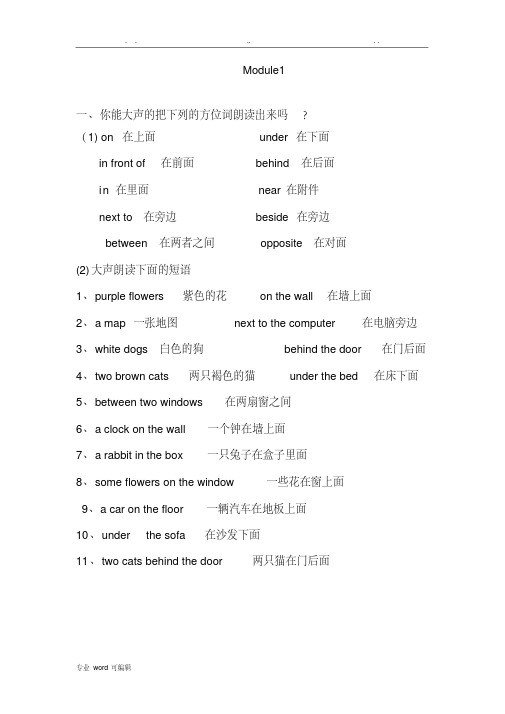
Module1一、你能大声的把下列的方位词朗读出来吗?(1) on 在上面under在下面in front of在前面behind 在后面in 在里面near在附件next to在旁边beside在旁边between 在两者之间opposite在对面(2)大声朗读下面的短语1、purple flowers 紫色的花on the wall在墙上面2、a map一张地图next to the computer 在电脑旁边3、white dogs白色的狗behind the door 在门后面4、two brown cats 两只褐色的猫under the bed在床下面5、between two windows在两扇窗之间6、a clock on the wall 一个钟在墙上面7、a rabbit in the box 一只兔子在盒子里面8、some flowers on the window 一些花在窗上面9、a car on the floor 一辆汽车在地板上面10、under the sofa 在沙发下面11、two cats behind the door 两只猫在门后面二、你可以看图把下面的单词写出来吗?b______ w_____ fl____erd_____ s_____三、看图回答问题1. Is there a computer next to the flowers? ______________________________2. Are there any cats behind the door?________________________________3、Wher is the maps ?__________________________4、Where are the cats?__________________________四、你可以根据设计情况回答问题吗?1. What’s in your bedroom\ room?(用There is a+物品来回答。
广州小学英语总复习及习题1

广州小学英语总复习及习题11,I think my mother is ____ beautiful than his.A, much B, more much C, much more 2, I’m sure you can catch up with _____.A, she B, his C, them D, ours 3, His house is small, but_____ is very bigA, she B, her C, hers D, me 4, Is there any _____ in the fridge?A, hamburger B, noodles C, beef D, potato 5, I love my mother. I _____ love my father.A, too B, either C, also D, doesn’t 6, Tomorrow will be_____ colder than today.A, more B, much C, most D, many 7, Miss Li ___ late in the morningA, get up B, does get up C, doesn’t get up D, isn’t get up 8, _____ the children’s mother often clean the house? Yes, she _____. A, Are, are B, Is, is C, Do, do D, Does, does 三,请根据提示用最高级写出班上同学的特点。
E某ample: I am the oldest in my class. (old)1,________________________________ (study) 2,________________________________ (run)3, ________________________________ (go to school) 4,________________________________ (hair) 5,________________________________ (young) 6,________________________________ (tall)三,下面每个句子中有一个错误,请把它划出来,并在横线上改正。
广州版小学英语复习资料
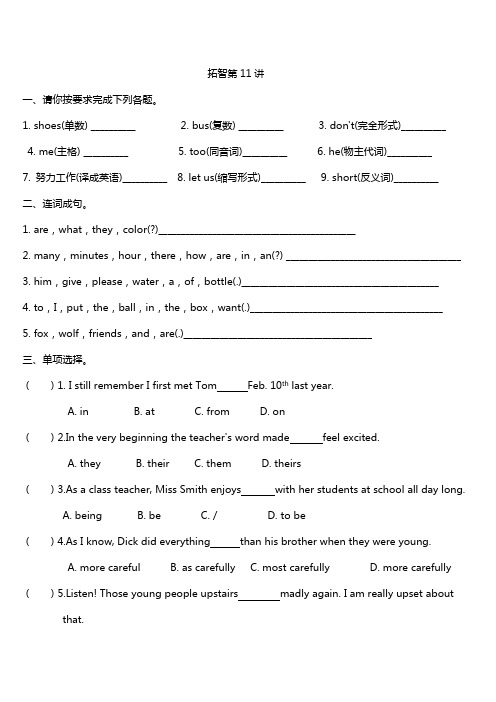
拓智第11讲一、请你按要求完成下列各题。
1. shoes(单数) __________2. bus(复数) __________3. don't(完全形式)__________4. me(主格) __________5. too(同音词)__________6. he(物主代词)__________7. 努力工作(译成英语)__________ 8. let us(缩写形式)__________ 9. short(反义词)__________二、连词成句。
1. are,what,they,color(?)____________________________________________2. many,minutes,hour,there,how,are,in,an(?) _______________________________________3. him,give,please,water,a,of,bottle(.)____________________________________________4. to,I,put,the,ball,in,the,box,want(.)___________________________________________5. fox,wolf,friends,and,are(.)__________________________________________三、单项选择。
()1. I still remember I first met Tom Feb. 10th last year.A. inB. atC. fromD. on()2.In the very beginning the teacher's word made feel excited.A. theyB. theirC. themD. theirs()3.As a class teacher, Miss Smith enjoys with her students at school all day long.A. beingB. beC. /D. to be()4.As I know, Dick did everything than his brother when they were young.A. more carefulB. as carefullyC. most carefullyD. more carefully ()5.Listen! Those young people upstairs madly again. I am really upset about that.A. singing and dancingB. are singing and dancingB. were singing and dancing D. sang and danced()6.Jacky's mother wasn't surprised to see her hungry son all the food on the table quickly.A. give upB. look upC. eat upD. get up()7.---Could you lend me a hand to carry this heavy box, Tom? ---_____________.A.sureB. Not at allC. Never mindD. Yes, please.()8.If you buy this mobile phone, you can get the earphone_________free.A. withB. forC. inD. by()9.--- will the first mail arrive? ---In about 20 minutes.A.How longB. How oftenC. How farD. How soon四、完形填空。
(完整版)广州版小学英语语法毕业总复习.docx

一、名词复数规则1.一般情况下,直接加-s ,如:book-books, bag-bags, cat-cats, bed-beds2.以 s. x. sh. ch 结尾,加-es ,如:bus-buses, box-boxes, brush-brushes, watch-watches 3.以“辅音字母+y”结尾,变 y 为 i,再加-es,如:family-families,strawberry-strawberries4.以“f 或 fe ”结尾,变 f 或 fe 为 v, 再加-es,如:knife-knives5.不规则名词复数:man-men, woman-women, policeman-policemen, policewoman-policewomen, mouse-mice child-children foot-feet,.tooth-teeth fish-fish,people-people, Chinese-Chinese, Japanese-Japanese写出下列各词的复数I _________him_________this ___________her______watch _______child _______photo ________diary ______ day________ foot________ book_______ dress ________tooth_______ sheep ______box_______ strawberry _____ thief _______yo-yo ______ peach______ sandwich ______ man______ woman_______ paper_______juice___________ water________ milk________ rice__________ tea__________二、一般现在时一般现在时基本用法介绍【No. 1】一般现在时的功能1.表示事物或人物的特征、状态。
广州小学英语总复习-必看
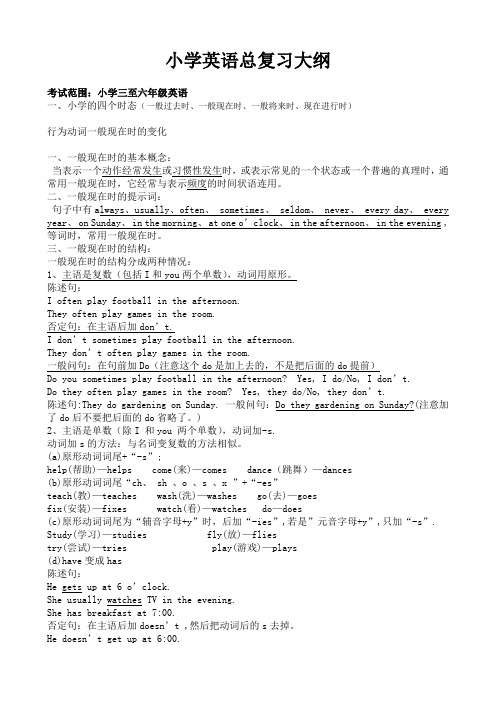
小学英语总复习大纲考试范围:小学三至六年级英语一、小学的四个时态(一般过去时、一般现在时、一般将来时、现在进行时)行为动词一般现在时的变化一、一般现在时的基本概念:当表示一个动作经常发生或习惯性发生时,或表示常见的一个状态或一个普遍的真理时,通常用一般现在时,它经常与表示频度的时间状语连用。
二、一般现在时的提示词:句子中有always、usually、often、 sometimes、 seldom、 never、 every day、 every year、 on Sunday、 in the morning、 at one o’clock、 in the afternoon、 in the evening ,等词时,常用一般现在时。
三、一般现在时的结构:一般现在时的结构分成两种情况:1、主语是复数(包括I和you两个单数),动词用原形。
陈述句:I often play football in the afternoon.They often play games in the room.否定句:在主语后加don’t.I don’t sometimes play football in the afternoon.They don’t often play games in the room.一般问句:在句前加Do(注意这个do是加上去的,不是把后面的do提前)Do you sometimes play football in the afternoon? Yes, I do/No, I don’t.Do they often play games in the room? Yes, they do/No, they don’t.陈述句:They do gardening on Sunday. 一般问句:Do they gardening on Sunday?(注意加了do后不要把后面的do省略了。
广州新版三年级英语总复习资料6.18
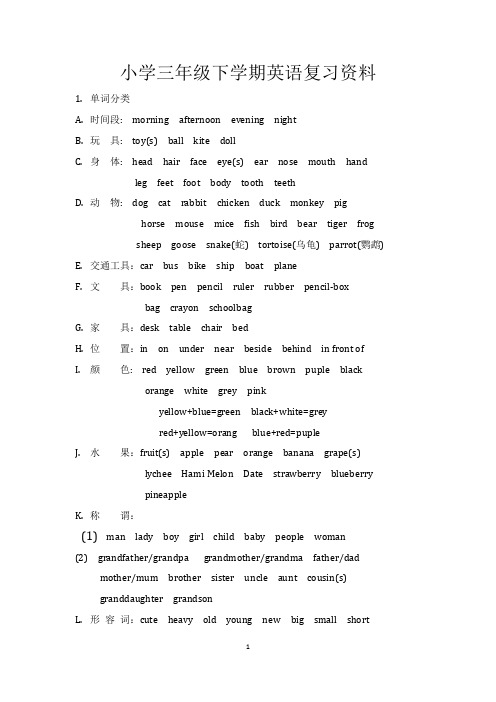
小学三年级下学期英语复习资料1.单词分类A.时间段: morning afternoon evening nightB.玩具: toy(s) ball kite dollC.身体: head hair face eye(s) ear nose mouth handleg feet foot body tooth teethD.动物: dog cat rabbit chicken duck monkey pighorse mouse mice fish bird bear tiger frogsheep goose snake(蛇) tortoise(乌龟) parrot(鹦鹉)E.交通工具:car bus bike ship boat planeF.文具:book pen pencil ruler rubber pencil-boxbag crayon schoolbagG.家具:desk table chair bedH.位置:in on under near beside behind in front ofI.颜色: red yellow green blue brown puple blackorange white grey pinkyellow+blue=green black+white=greyred+yellow=orang blue+red=pupleJ.水果:fruit(s) apple pear orange banana grape(s)lychee Hami Melon Date strawberry blueberrypineappleK.称谓:(1)man lady boy girl child baby people woman(2) grandfather/grandpa grandmother/grandma father/dadmother/mum brother sister uncle aunt cousin(s)granddaughter grandsonL.形容词:cute heavy old young new big small shorttall strong thin happy lovely funny greatlong little pretty ugly beautiful2.单词复数形式A.一般在名词词尾(e)加S例bird-birds bike-bikes map-mapsB.以s,x,ch,sh结尾的名词加es例box-boxes class-classes watch-watches dish-dishesC.以辅音字母y结尾的名词,改y为i+es例baby-babies family-families study-studies city-citiesD.以原音字母y结尾的名词,直接加s例boy-boys toy-toysE.没有规律地单词例man-men woman-women child-children foot-feet tooth-teeth mouse-mice goose-geeseperson-peopleF.不分单复数的单词例fish-fish sheep-sheep deer-deer Chinese-Chinese3.课堂笔记A. has 用在he she ithave用在I you we theyB. Whose ~(单数)is this/that/it? It’s ~’s.Whose~s(复数)are these/those/they? They’re ~’s.C. What are these/those/they~? They’re ~s.D. 元音开头的单数apple-an apple orang-an orangF. Is there a ~…? Yes,there is. No,there isn’t.Are there some/any ~…? Yes,there are. No,there are’t.G.Is a ~…? Yes,it is. No,it isn’t.H.Who is he? He is …Who is she? She is…I.How many +复数名词+are there+地点?There is one~…There are two/~…J.Are these/those/they~…?Yes,they are. No.they aren’t.5.课文重点句U1 Let’s go to play. Oh,good idea. What colour is it? It’s red.U2 Let’s colour the nose red. Ok.U3 Where is my car? It’s on the table. Is it in the box?No,it isn’t. Is it on the table? Yes,it is.U4 Mum,where is my English book? Is it in front of the TV?No, it isn’t. Is it behind your bed? No, it isn’t.Is it in your schoolbag? Oh,yes.U5 How old are you? I’m nine. Happy birthday! Thank you.This is for you. Thank you.U6 May I have your telephone number,Ms White?Yes.Eight-seven-two-nine-zero-four-six.U7 Do we have bananas? No,we don’t.May I have some grapes,then? Yes.Here you are.U8 Can I have some fruit,Mum? Of course.What fruit do you like? I like grapes. Apples are good for us.U9 Is this a photo of your family,Ben? Yes,it is.Who is he? He is my uncle. There is a strong man in it.U10 How many people are there in your family,Jiamin?There are five. Who are they?They are my grandfather,grandmother,my father,my mother and me.U11 Are there any cats in your shop? No,there aren’t.There are some little ducks over there.Those ducks are lovely. My cousin has one.U12 These two rabbits are white. They have small red eyes,long ears and short tails. They’re very cute. Yes, they really are.Are they your rabbits,Janet? No, they aren’t.Whose rabbits are these? They’re my cousin’s.一、选择填空1、There ________( is , are ) many ducks in the pet shop.2、There ________(is ,are ) a mouse under the desk.3、The cute rabbits ______( are, aren’t) Janet’s. They’re Ms White’s.4、How many________(book,books)are there in your school bag? There _____(is,are ) one.5、My father_______(have , has) three dogs. But I ______(have, has) two cats.6、I have ______(a, an) orange ruler, that yellow pencil is _________( my sister, mysister’s).7、___________ (Are there ,There are ) any pigs over there?No,__________(there are, there aren’t).8、The apples are good _______( for, of) us. I want _______(some, an) apples.9、There aren’t_______(any, some) monkeys in the tree ,But there are_______(some, any) birds in it.10、_________(Where, What colour ) is your robot ? It’s yellow and pink.11、_________(How many , How old ) are you ? I’m ten.12、________(Where , What) is your toy bear? It ‘s near the bed.13、________(Whose, Who’s) chickens are these? They are my father’s.14、________(Whose, Who) are the children? They are my cousins.15、Happy birthday ! ______________(Thank you, Goodbye)16、_______(Are ,Do) you have any crayons? Yes, _________(I do, I am).17、I don’t have brothers,_______( and , but) I hav e a sister.18、My father’s father is my __________( grandfather, uncle)19、The tall______(man, woman) is my aunt.20、My mother isn’t thin, she is ______(small, heavy).21、________( How many , Where) pears are there on the table ? There are five.22、There are six________(mouse, mice) in the box. They are _______(love, lovely).二、选择问题的正确答案。
广州版小学英语知识点总结
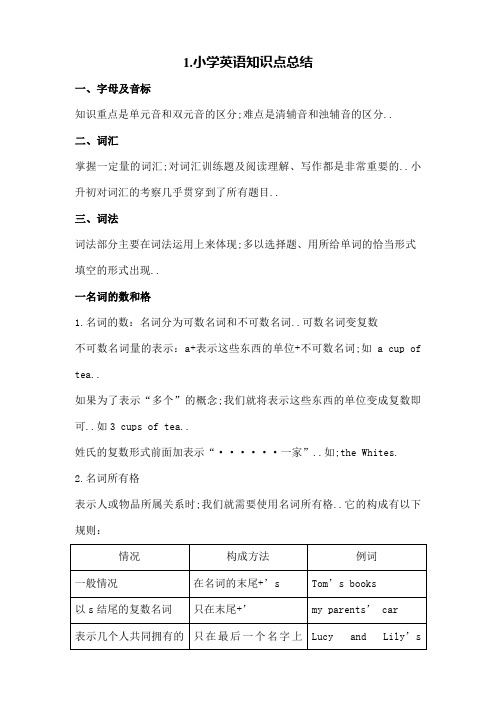
1.小学英语知识点总结一、字母及音标知识重点是单元音和双元音的区分;难点是清辅音和浊辅音的区分..二、词汇掌握一定量的词汇;对词汇训练题及阅读理解、写作都是非常重要的..小升初对词汇的考察几乎贯穿到了所有题目..三、词法词法部分主要在词法运用上来体现;多以选择题、用所给单词的恰当形式填空的形式出现..一名词的数和格1.名词的数:名词分为可数名词和不可数名词..可数名词变复数不可数名词量的表示:a+表示这些东西的单位+不可数名词;如 a cup of tea..如果为了表示“多个”的概念;我们就将表示这些东西的单位变成复数即可..如3 cups of tea..姓氏的复数形式前面加表示“······一家”..如;the Whites.2.名词所有格表示人或物品所属关系时;我们就需要使用名词所有格..它的构成有以下规则:二动词表示动作和状态的词叫做动词..通常词的学习与时态结合起来学习;它分为:一般现在时“三单”人称V. + s/es; 一般过去时V. + ed; 现在进行时V. + ing ..三形容词、副词形容词和副词的比较级和最高级的构成规则:通常词尾+er / est..比较级和最高级不规则变化的形容词和副词:many/much-more-most; good/well-better-best; bad/badly-worse-worst; little-less-least 形容词和副词的比较级和最高级的用法:比较级用于二者的比较;表示“更······”之意..而最高级用于三者或三者以上的比较..表示“最······”..两者比较时句中有than..形容词最高级前一定要有the;而副词最高级前则不需要..四代词:人称代词和物主代词1.人称代词的宾格2.名词性物主代词3.不定代词some、any、one、ones:some表示“一些”;可以接可数复数名词..any 用在疑问句或否定句中..One代表单数可数名词;ones代表复数可数名词..五数词数词包括基数词和序数词..它们的用法:时间的表达、年、月、日的表达、数学符号的表达..六冠词冠词分为定冠词、零冠词和不定冠词..1.不定冠词:a用在以辅音音素开头的单数可数名词..an用在以元音音素开头的单数可数名词前..2.定冠词the的用法:特指某一个具体的人或事物;指说话的两个人都心照不宣的同一个人或事物;指上下文中提到的人或物;用在序数词、形容词最高级以及方位词的前面..用在世界上独一无二的事物前;用在乐器名词前;用在固定搭配中..3.零冠词:国名、地名、人名等专有名词前;名词前已经有this、that、his、my、any等限定词时;其它情况..七介词1.介词in的用法:1 in 后面加上“衣帽”类单词;表示“穿戴着……”..如:In a coat 穿着外套 in dress穿着裙子In T-shirts穿着短袖 In shorts穿着短裤in shoes穿着鞋子 In socks穿着袜子2in 后面加“位置”类单词;表示“在……里面”..如:The books are in my desk. 这些书在我的书桌里..2. at: 在1 表示时间;后接具体时间点;2 表示地点;后接小地点Let’s meet at 7:00 in the evening.I am at home now.3. With: 有;和……在一起with a cap 、 with a hatWith a bag in her hands. 她手里拿着一个包..4. Beside: 在……旁边There is a river beside my house.四、句法与句型小学部分涉及到四种时态:一般现在时、一般将来时、一般过去时、现在进行时..在考试的作文部分;经常会考到:描写人、动物、城市、植物、节日、季节、过去事情、一天的日程安排、计划及看病、问路、打电话等话题的作文..在写的时候首先一定要选准时态;每时每刻都要注意有没有用错;写完一定要复查..一一般现在时1.一般现在进行时的定义及标识词:表示经常、习惯性动作..关键是掌握①标志词:always; usually; often; never; sometimes; seldom; every+时间等..②当主语是第三人称单数时;动词就要加s/es.其它人称统一用动词原形..二一般将来时1.一般将来时表示将要发生的事情..通常用两种形式来表示:1be going to+动词原形;2will/shall+动词原形..前者强调“打算”要做一件事情;而后者只是客观地说明一件事情将要发生..三一般过去时1.一般过去时表示在过去某一时间里发生的事情..我们用动词的过去式来表示;也就是说在动词末尾+ed来完成..四现在进行时1.现在进行时表示正在进行的动作..其谓语的特点是:be + V-ing..学好现在进行时的关键是①be动词的选择②动词—ing的变化规则..刚开始学习英语的同学;往往对我联系动词be与主语人称保持一致的问题把握不好..为此;建议在歌谣中熟悉我联系动词的“身影”:我用am;你用are;is用在他、她、它;遇到复数全用are..五There be句型There be句型用来表示某地 /某时有某物/某人..五、英语常识英语常识渗透在一些主观题上;平时一定要多留心..1.常见的节日2.国家、首都、语言、国籍、最大的城市3.中国和西方不同之处六、课后练习一、语音:找出划线部分读音不同的单词B. bookC. lookD. cook1. A. toothB. spreadC. meanD. peace2. A.cheapB. roundC. houseD. young3. A.loudB. noiseC. hasD. maps4. A.flags5. A.B. bankC. certainD. drinkuncle二、单项选择6. I have ________ to tell you. But first; please help _________ to _________fish; children.A. anything important; our; anyB. something important; yourselves; someC. important everything; yours; eachD. important thing; us; other7. Tom and Jerry are twins and they are_________. Their family ________ good. Now the family_________ watching TV.A. we heros; are; areB. ours heros; are; isC. our heroes; is; areD. us heroes; is; is8. ---Have you seen _____bag I left it here just now. It’s _____ Browns.--- Is it ________ one on the chair near the doorA. a; the; theB. the; the; theC. a; a; aD. the; the; a9. Do it__________. The film will be on_________ 30 minutes. I think the Captain America. The first Avenger is __________ X Men.A. quickest; by; more 2 hundreds times interesting thanB. quicker; for; 2 hundred time less interesting thanC. more quickly; in; 2 hundred times less interesting thanD. quicklier; to; 2 hundreds time more interesting than10. When we are________; he is alone _________ with nothing.A. at table; at the tableB. at a table; on tableC. on the table; on tableD. on table; at a table11. The weather is not too cold______ too hot in this season. Let’s go ______ a science trip.A. and; forB. nor; toC. but; withD. or; on12. She is ________ surprised________ she can’t believe her eyes. I’ll tell her the truth________ I see her.A. too; to; andB. so; that; as soon asC. such; so; whenD. not; but; that13.There_________ any bread in the fridge. Let’s _________ to buy some;________A. are; goes; will youB. is; going; will youC. aren’t; went; shall weD. isn’t; go; shall we14. I_______ nothing in my pocket. But ________ iPhone and 2 computers on the table.A. have; there is anB. has; I haveC. there be; there areD. there be; there is a15. Her handwriting is as________ as________.A. well; IB. better; meC. good; mineD. best; mind16. _________ clever you areA. What aB. HowC. WhatD. How a17. I want to find a good book. I’m going to the_________.A. cinemaB. libraryC. museumD. supermarket18. Who’s the lady _______ blueA. inB. onC. atD. with19. Those must________ tulips.A. beingB. isC. areD. be20. ---_________do you go to the cinema ---Seldom.A. WhenB. What timeC. How oftenD. Which三、根据中文; 完成下列的句子; 每空格填一词..21. 孙中山反对帝制;他尽力改变中国和解放人类..Dr .Sun Yatsen was__________ the emperor. He_________ to change China and _______ the people.22. 莫扎特是最伟大的音乐家之一..Mozart was ______________ of the __________ _______________.23. 每天狮子在深林里四处闲逛找食物; 一旦抓到公牛;它就马上把牛吃光..Every day; the lion went around in the forest___________ for food. Once it catches one bull; it will eat it ____________ at ___________.。
最新广州英语六年级下学期复习资料
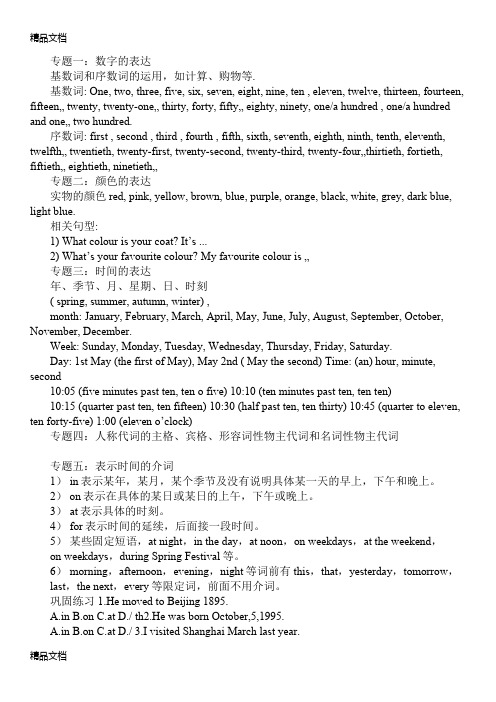
专题一:数字的表达基数词和序数词的运用,如计算、购物等.基数词: One, two, three, five, six, seven, eight, nine, ten , eleven, twelve, thirteen, fourteen, fifteen… twenty, twenty-one… thirty, forty, fifty… eighty, ninety, one/a hundred , one/a hundred and one… two hundred.序数词: first , second , third , fourth , fifth, sixth, seventh, eighth, ninth, tenth, eleventh, twelfth… twentieth, twenty-first, twenty-second, twenty-third, twenty-four…thirtieth, fortieth, fiftieth… eightieth, ninetieth…专题二:颜色的表达实物的颜色red, pink, yellow, brown, blue, purple, orange, black, white, grey, dark blue, light blue.相关句型:1) What colour is your coat? It’s ...2) What’s your favourite colour? My favourite colour is …专题三:时间的表达年、季节、月、星期、日、时刻( spring, summer, autumn, winter) ,month: January, February, March, April, May, June, July, August, September, October, November, December.Week: Sunday, Monday, Tuesday, Wednesday, Thursday, Friday, Saturday.Day: 1st May (the first of May), May 2nd ( May the second) Time: (an) hour, minute, second10:05 (five minutes past ten, ten o five) 10:10 (ten minutes past ten, ten ten)10:15 (quarter past ten, ten fifteen) 10:30 (half past ten, ten thirty) 10:45 (quarter to eleven, ten forty-five) 1:00 (eleven o’clock)专题四:人称代词的主格、宾格、形容词性物主代词和名词性物主代词专题五:表示时间的介词1) in表示某年,某月,某个季节及没有说明具体某一天的早上,下午和晚上。
广州版五年级英语(上)总复习资料与复习题
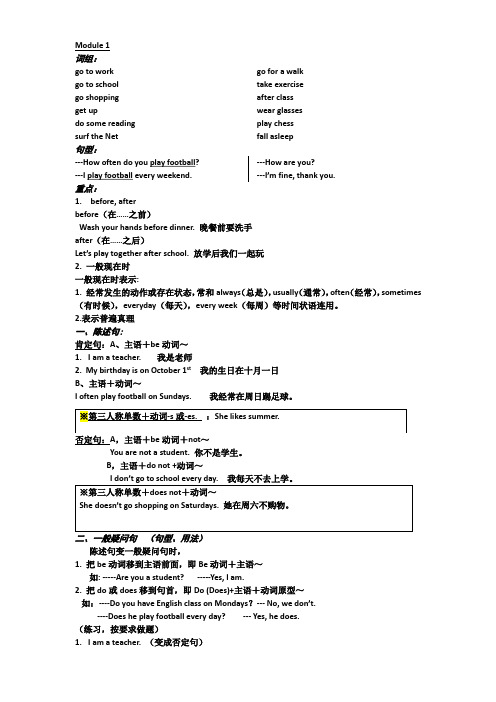
Module 1词组:go to work go to school go shopping get updo some reading surf the Netgo for a walk take exercise after class wear glasses play chess fall asleep句型:---How often do you play football? ---I play football every weekend.---How are you?---I ’m fine, thank you.重点:1. before, afterbefore (在……之前)Wash your hands before dinner. 晚餐前要洗手 after (在……之后)Let’s play together after school. 放学后我们一起玩 2. 一般现在时 一般现在时表示:1. 经常发生的动作或存在状态,常和always (总是),usually (通常),often (经常),sometimes (有时候),everyday (每天),every week (每周)等时间状语连用。
2.表示普遍真理一、陈述句:肯定句:A 、主语+be 动词~ 1. I am a teacher. 我是老师2. My birthday is on October 1st 我的生日在十月一日 B 、主语+动词~I often play football on Sundays. 我经常在周日踢足球。
否定句:A ,主语+be 动词+not ~You are not a student. 你不是学生。
B ,主语+do not +动词~陈述句变一般疑问句时,1. 把be 动词移到主语前面,即Be 动词+主语~ 如: -----Are you a student? -----Yes, I am.2. 把do 或does 移到句首,即Do (Does)+主语+动词原型~ 如:----Do you have English class on Mondays ?--- No, we don’t. ----Does he play football every day? --- Yes, he does. (练习,按要求做题)1.I am a teacher. (变成否定句)2. You are student. (变成一般疑问句)spring 春天summer 夏天autumn 秋天winter 冬天月份一月:January 二月:February 三月:March 四月:April五月:May六月:June 七月:July八月:August.九月:September 十月:October十一月:November 十二月:December序数词first(第1) second(第2) third(第3) fourth (第4) fifth(第5) sixth(第6) seventh(第7) eighth(第8)ninth(第9)tenth(第10)eleventh(第11)twelfth(第12)thirteenth(第13)fourteenth(第14)fifteenth(第15)sixteenth(第16)seventeenth(第17)eighteenth(第18)nineteenth(第19)twentieth(第20)其他重点:at, on, in 的用法和区别at: (用于表示时刻、时间的某一点)at nine (o’clock) 在九点at 6:30on: (用于表示具体的某一天,具体某天的上午或下午)on Monday 在周一on Tuesday morning在周二的早上on June 6th 在六月六号on the weekend 在周末in: (用于月、年、季节,泛指的上午或下午)in May in Julyin summer in winterin 1996 in 2008in the morning in the afternoon(练习,填入合适的介词)1. I go to bed 9:30.2. We have English class 10:003. I often play the piano Sundays.4. Teacher’s day is September.5. My birthday is December 12th.补充:节日New Year’s Day 元旦Women’s Day 妇女节May Day 劳动节Children’s Day 儿童节Army Day 建军节Teacher s’ Day 教师节National Day 国庆节Module 21. Can 表示能力:“能,会,可以”它没有人称和数的变化,它后面必须跟动词原型。
广州小学英语三年级到六年级知识点总结

广州小学英语三年级到六年级知识点总结广州小学英语(三年-六年级)课文主要知识点汇总三年级(上册)单词、词组168个Module 1 Greetings 1,打招呼用语 2,字母Aa------Hh的听说读写Module 2 Introductions 1,自我介绍2,字母Ii-----Qq的听说读写 3,中文姓名的表达Module 3 Body 1,身体部位的名称 2,字母Rr-----Zz的听说读写 3, 祈使句 4,“a”和“an”Module 4 Family 1,复习26个字母 2,家庭成员名称Module 5 Toys 1,复习26个字母 2,动物,交通工具名称Module 6 School things 1,复习26个字母 2,文具类,生活用品类名称三年级(下册)单词、词组166 个Module 1 Colours 1,颜色的词汇Module 2 Positions 1,方位介词: on, in, at, under, near, behind, beside, in front of,Module 3 Personal information 1,数词 1---10 的表达Module 4 Fruits 1,水果的词汇Module 5 Relatives 1,形容词形容家人Module 6 Pets 1,宠物名词四年级上册单词216个、词组80个Module 1 My bedroom 1, 卧室和家具的词汇; 2,方位介词:in, on, between, near, next, behind, beside, opposite,,, Module 2 My House 1, 房间的词汇: 2,“有”的表达:have/ has; there beModule 3 My school 1,与学校有关的词汇;2,部分数词,1----10; 20---30Module 4 My class 1, 学科词汇; 2,用数量词表示物体Module 5 Clothes : 1, 询问价格2, 衣物类单词3, 数词的记忆Module 6 Occupations : 1, 职业的词汇;2,句型:What do you want to be want you grow up? 2. What does he do?四年级下册单词179个词组130个Module 1 People : 1,如何描述人的外貌和性格Module 2 Daily routine 2,与日常生活为主题的词汇 2,时间的表达Module 3 Days of the week 1,星期的表达Module 4 Activities 1,日常活动的词汇 2,现在进行时Module 5 Sports 1,体育运动有关的词汇Module 6 Celebrations 1,月份与节日的表达五年级上册单词199个词组200个Module 1 Hobbies 1,爱好主题相关的词汇; 2,动词现在分词Module 2 Abilities ; 1. 活动名称,运动场所,职业的词汇; 2,情态动词“Can”的用法Module 3 Daily life 1,日常生活的词汇,2,第三人称单数的使用方法Module 4 Foods and drinks 1,饮料与食品有关的词汇, 2,食物数量的表达Module 5 Foods we need 1,表达食物的味道,2,食物数量的表达Module 6 Weather 1,天气相关的词汇, 2, 数字,月份季节等五年级(下册)Module 1 Seasons 1,季节的词汇Module 2 Plans 1,与计划有关的活动名称及序数词 2,日期的表达 3,一般将来时Module 3 Invitations 1,与邀请相关的词汇Module 4 Travel 1,与旅游相关的词汇 2,交通工具的表达Module 5 Safety 1,与安全相关的词汇 2,祈使句用法 3,情态动词Module 6 Directions 1,与问路相关的词汇 2,祈使句用法六年级(上册)单词107个词组118个Module 1 Country Life : 农村生活词汇;Module 2 City Life ; 动物类,植物类,城市生活词汇Module 3 Health : 一般过去时,健康方面词汇Module 4 Past Experiences : 一般过去时,描述过去经历Module 5 Changes : 一般过去时,描述过去经历Module 6 Festivals : 1.中西方传统节日的名称,相关的活动; 2,时间介词 in, on at六年级下册单词140个词组130个Module 1 Stories 1,与故事有关的词汇 2,动名词做主语Module 2 Animals 1,与动物有关的词汇Module 3 Famous people 1,与历史人物有关的词汇 2,感叹句Module 4 Good manners 1,与文明礼仪有关的词汇 2,Module 5 Travel abroad 1,与旅游有关的词汇Module 6 Let's look back。
2022-2023年最新广州版英语四年级上册期末复习资料

2022-2023年最新广州版英语四年级上册期末复习资料Unit 1: Greetings and Introduction- Basic greetings: Hello, Hi, Good morning, Good afternoon, Good evening, Goodbye.- Introduce oneself: My name is [name]. Nice to meet you.- Ask and answer questions about names, ages, and nationalities.Unit 2: Numbers and Colors- Count and recognize numbers from 1 to 100.- Identify and name basic colors: red, blue, yellow, green, orange, purple, pink, brown, black, white.Unit 3: Family and Relationships- Learn vocabulary related to family members: father, mother, brother, sister, grandfather, grandmother.- Describe family relationships using possessive pronouns: my, your, his, her.Unit 4: School Life- Classroom objects: desk, chair, book, pencil, eraser.- Express likes and dislikes: I like/dislike [object/activity].Unit 5: Food and Drinks- Names of vegetables and fruits: carrot, tomato, potato, apple, banana, orange, etc.- Express hunger and thirst: I'm hungry/thirsty.Unit 6: Weather and Seasons- Learn vocabulary related to weather conditions: sunny, cloudy, rainy, windy.- Recognize and name the four seasons: spring, summer, autumn, winter.Unit 7: Daily Activities- Express daily routines: wake up, brush teeth, take a shower, eat breakfast, etc.- Ask and answer questions about daily activities using simple present tense.Unit 8: Animals and Pets- Learn vocabulary related to animals: cat, dog, rabbit, bird, fish, etc.- Express preference for certain animals: I like dogs/cats/birds.Unit 9: Hobbies and Leisure Activities- Vocabulary related to hobbies: draw, sing, dance, play basketball, swim, etc.- Express likes and dislikes for activities: I like/dislike swimming.Unit 10: Occupations and Jobs- Learn vocabulary related to occupations: doctor, teacher, firefighter, police officer, etc.- Ask and answer questions about people's professions.以上是2022-2023年最新广州版英语四年级上册期末复习资料的内容。
广州四年级英语下册总复习.doc
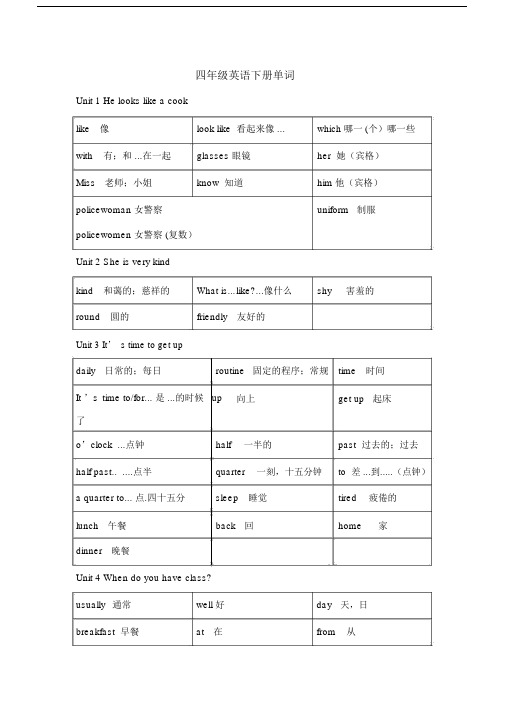
四年级英语下册单词Unit 1 He looks like a cooklike 像look like 看起来像 ... which 哪一 (个)哪一些with 有;和 ...在一起glasses 眼镜her 她(宾格)Miss 老师;小姐know 知道him 他(宾格)policewoman 女警察uniform 制服policewomen 女警察 (复数)Unit 2 She is very kindkind 和蔼的;慈祥的What is... l ike?...像什么shy 害羞的round 圆的friendly 友好的Unit 3 It’ s time to get updaily 日常的;每日routine 固定的程序;常规time 时间It ’s time to/for... 是 ...的时候 up 向上get up 起床了o’clock ...点钟half 一半的past 过去的;过去half past.. ....点半quarter 一刻,十五分钟to 差 ...到.....(点钟)a quarter to... 点.四十五分sleep 睡觉tired 疲倦的lunch 午餐back 回home 家dinner晚餐Unit 4 When do you have class?usually通常well 好day天,日breakfast 早餐at在from从from...to.... 从...到 .. exercise 练习take exercise 体育锻炼run 跑步go running 去跑步swim 游泳Unit 5 What day is it today?week 周末today 今天Wednesday 星期三Thursday 星期四why 为什么Sunday 星期天Monday 星期一Tuesday 星期二Friday 星期五Saturday 星期六Unit 6 What do you usually do on Sunday?always 总是parent 父(母)亲housework 家务never 从来不often 经常go shopping 去购物park 公园visit 参观film 电影Unit 7 What do you do when you have free time ?free 空闲的;自由的feel 感觉bored 烦闷的Me too. 我也是do some reading读点书interesting 有趣的cartoon 漫画shall 将要Shall we...?我们 ...好吗?king 国王Monkey King 猴王take photos 拍照listen to... 听.... email 发电子邮件;电子邮件picnic 野餐Unit 8 What are you doing?have a look 看一下fish钓鱼fly放(风筝);飞dance跳舞Unit 9 It looks funfun 有趣basketball 篮球football 足球kung fu 功夫;武术think 想skate 溜冰try 试;尝试table tennis 兵乓球jump 跳the long jump 跳远hight 高的;高地the high jump 跳高tennis 网球chess (国际)象棋Unit 10 I am very fastarm 手臂volleyball 排球fast 快的;飞快地water 水bath 洗澡take a bath 洗澡clever 聪明的badminton 羽毛球Unit 11 I was born in Januarycelebration 庆祝January 一月present 礼物card 卡;卡片go on 进行party 聚会was 是( is,am的过去式)candle 蜡烛be born... 生于cake 蛋糕February 二月March 三月November 十一月Unit 12 Christmas is comingChristmas 圣诞节December 十二月already 已经soon 不久lot 许多lots of 许多的;大量的dress 穿着as 如;像Father Christmas圣诞老人July 七月summer 夏天holiday 假日May 五月Mother’s Day 母亲September 九月节Teachers’Day 教师节October 十月Halloween 万圣节spring 春天Spring Festival 春节Module1 People● 必背单词职业:policewoman builder doctor farmer nurse cook driver singer painter 警察建筑师医生农民护士厨师司机歌手画家PE teacher Chinese teacher art teacher maths teacher English teacher 体育老师语文老师美术老师数学老师英语老师衣服uniform jacket coat jeans dress制服夹克大衣牛仔连衣裙shirt trousers T-shirt shortssweater blouse jeans衬衫长裤T 恤短裤毛衣女士衬衫牛仔裤颜色red black yellow green pink brown white purple 红色黑色黄色绿色粉色棕色白色紫色blue orange grey蓝色橙色灰色身体部位hair eye nose mouth tooth(teeth) ear face foot(feet)头发眼睛鼻子嘴牙齿耳朵脸脚形容词round long tall short happy beautiful kind圆的长的高的矮的开心的漂亮的和蔼的strong pretty friendly lovely强壮的漂亮的友好的可爱的● 必背课文Unit 1 He looks like a cook①Who’ s that woman?②Which woman?③The one with glasses. She has a bag beside her.④She’ s Miss Liu, our teacher .⑤And that man in a white hat? Can you see him?⑥ Yes. But I don t know’ him. He looks like a cook.Unit 2 She is very kind① The new English teacher is in the teachers’ room.②Really? What is she like?③She has green eyes and a small mouth.④And she is very young and shy.⑤She is very kind.● 测试题一单项选择题( ( ( ) 1 That man in a blue jacket is my father. Can you see____?A her B. him C. it) 2 Kate is a girl ______ glasses and ______ a brown dress.A in, with B. with,with C. with,in) 3---Who ’s that boy?--- ____ boy?--- The one with a hat in a blue jacket.A which B. what C. Who’s( ) 4 That man in a white coat____ like a doctor.A look B. looks C. Are( ) 5 The woman in a yellow hat and blue jeans is like a ______. She works on the farm.A. policewomanB. nurseC. Farmer( ) 6. There are two_____ in the garden.A. manB.menC. Mans( ) 7. He________ a farmer.A. look likeB.looking likeC.looks like( ) 8. He has brown______and big_____ .A.hairs,toothB.hair,teethC.hairs, teeth( ) 9 Look at that boy_______short hair and a round face. Do youknow him?A. haveB. withC. Has( ) 10 What is your Chinese teacher ___________?A.look likeB. likeC. Look( ) 11The old man is tall and thin. He is very _________.A.kind and friendlyB.short hairC.round face( ) 12–What is the baby like?--He has__________face a.nd he is happy.A. roundB. shortC. big nose( ) 13. __________that woman? ---- She is my teacher.A. WhoB.WhoseC. Who’s二用所给的疑问词填空How Who Where What Which1.--_____________is the maths teacher?-- He’s in the teachers’office.2.--_____________is the old man in the garden?-- I think he’s Mike’s grandfather.3.--_____________is your new PE teacher like?--He is tall and strong. But he looks kind.4.– There are two girls in the photo. ____________is your sister?--The one with black hair.5.______________is your grandfather?--He is fine, thank you.三按要求填空1.he(宾格 )____________________2. policewoman(复数 ) ____________________3.friend(形容词 ) ______________4. her(主格 ) ____________________5.glass(复数 )_________________四选出不同类的词() 1. A. which B. what C. with D. who() 2. A. big B. tall C. thin D.know() 3. A. nose B. round C. face D.hair() 4. A. policeman B. builder C. cook D.uniform() 5. A. really B.happy C.kind D.friendly() 6. A. skirt B.jeans C.trousers D.shorts() 7. A.round B.long C.happy D.shortModule2 Daily routine● 必备短语time for class time for lunch time for dinner上课的时候午饭的时候晚饭的时候time to go back home time to do my homework回家的时候做作业的时候get up have breakfast have classes have lunch起床吃早餐上课吃午餐take exercise do homework watch TV做锻炼做家庭作业看电视● 必备课文Unit 3 It’ s time to get up①Mum, what time is it ?②It ’s7 o’clock. It ’stime to get up.③It ’shalf past seven now , time to go to school.④It ’sa quarter to ten. It’s time to sleep.⑤Great. I am so tired.Unit 4 When do you have class?①What time do you usually have breakfast?②Well, on school days I usually have breakfast at 7 ’oclock in the morning.③I see. And when do you have class?④I have classes from 8 o’clock in the morning to 4:30 in the afternoon.⑤Hmmm. Do you take exercise?⑥Oh yes. I usually go running or swimming in the afternoon from 4:30 to 5:30.⑦Thank you very much.● 时间表达1) 整点时间:数字 +o’clock 如: 8: 00 eight o’clock.2) 半点时间: half past + 小时数 9:303) 一刻钟( 15 分钟或者 45 分钟)1. a quarter past +小时(过 15 分钟) 2: 15 .2. a quarter to +小时 (差 15 分钟 ) 3: 454)还可以直接读小时和分钟数,来表达任何时刻,这样更容易说。
(完整版)广州版小学英语毕业班重点语法复习

语法复习姓名:一、名词单数变复数规则:1.一般名词复数是在名词后面加上“s”,如map→maps, bag→bags等;2. 以s,sh,ch,x等结尾的词加“es”,如bus→buses,watch→watches等;3. 以辅音字母+y结尾的词,变y为i加es,如baby→babies等;4.Photos,potatoes ,tomatoes二、时态:(1)一般现在时(通常做):1.(often, always, never, usually, seldom, sometimes, every)通常做2. 主语为第三人称单数he, she, it, 单数名词等,动词变成第三人称形式:1)一般在动词后直接加s,e.g. likes;2)以o, s, x, sh, ch结尾加es, e.g. washes;3)以辅音+y结尾,去y改i 加es, e.g. studies;4)不规则:have---has.(2)现在进行时(正在做):is/am/are doing (now, look, listen, 具体时间点)(3)一般将来时(将要做):will+V原/be going to+V原(tomorrow, next, 将来的时间)(4)动词过去式(过去做): (yesterday, last, this morning, 过去的时间)规则:1)一般在动词末尾加ed,work-worked, watch-watched2)以不发音的e结尾,直接加d,live-lived, dance-danced,die-died,3)辅音加y结尾,把y改为i加ed, cry-cried, try-tried, study-studied, carry-carried,4)重读闭音节动词(辅元辅),双写词尾辅音字母,再加—ed, 如:stop—stopped不规则:ride-rode, take-took, sell-sold, give-gave, buy-bought, bring-brought, meet-met, see-saw, wear-wore, feel-felt, read-read固定用法:喜欢做like /enjoy/love+cooking like to cook 想做want to cook 帮忙做help sb cook 能做can do 应该做should do Do/does/ did, don’t + V原see sb doing看见某人正在做三、人称代词四、介词1.方位介词在里面in, 在上面on, 在旁边next to,beside, 在附近near, 在左边on the left(of), 在右边on the right(of), 在前面infront of, 在后面behind,2.时间in +年,月,星期,在一段时间内on+具体的某一天at+几点钟for+一段时间from...to...从几点到几点一、用所给单词的正确形式填空。
完整word版)广州新版四年级英语下册总复习
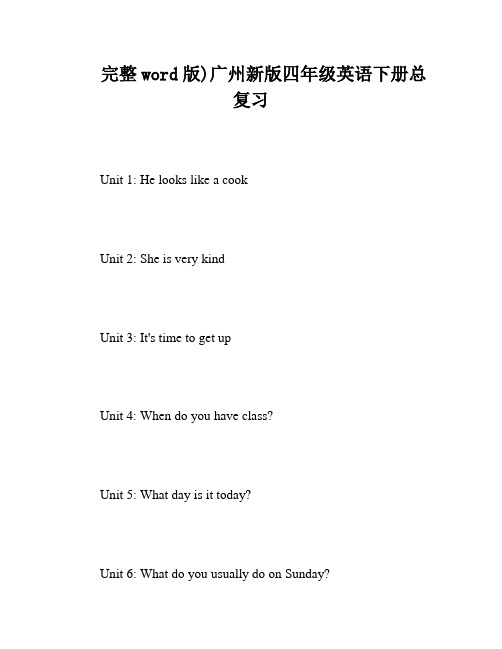
完整word版)广州新版四年级英语下册总复习Unit 1: He looks like a cookUnit 2: She is very kindUnit 3: It's time to get upUnit 4: When do you have class?Unit 5: What day is it today?Unit 6: What do you usually do on Sunday?Unit 7: What do you do when you have free time?In this unit。
we learn how to talk about our free time activities。
We learn that "free" means not busy and "feel" means to ___。
We also learn how to agree with someone using the phrase "Me too".2 What is the name of the new art teacher?3 She has a bag beside her。
Who is she?4 What does the new English teacher look like?5 Which of the following is not a body part?6 What color is not ned in the list?7 Which of the following is not a teacher?8 Which of the following is not a piece of clothing?二改写句子1.The woman with glasses。
who has a bag beside her。
广州版小学四年级英语上册期末总复习资料
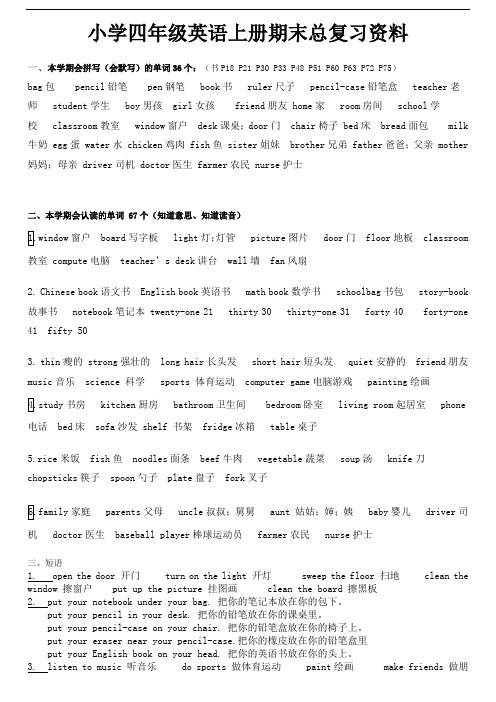
小学四年级英语上册期末总复习资料一、本学期会拼写(会默写)的单词36个:(书P18 P21 P30 P33 P48 P51 P60 P63 P72 P75)bag包 pencil铅笔 pen钢笔 book书 ruler尺子 pencil-case铅笔盒 teacher老师 student学生 boy男孩 girl女孩 friend朋友 home家 room房间 school学校 classroom教室 window窗户desk课桌;door门chair椅子 bed床bread面包milk 牛奶 egg蛋 water水 chicken鸡肉 fish鱼 sister姐妹 brother兄弟 father爸爸;父亲 mother 妈妈;母亲 driver司机 doctor医生 farmer农民 nurse护士二、本学期会认读的单词 67个(知道意思、知道读音)窗户 board写字板 light灯;灯管 picture图片 door门 floor地板 classroom 教室 compute电脑teacher’s desk讲台 wall墙 fan风扇2.Chinese book语文书 English book英语书 math book数学书 schoolbag书包 story-book 故事书 notebook笔记本 twenty-one 21 thirty 30 thirty-one 31 forty 40 forty-one 41 fifty 503.thin瘦的 strong强壮的 long hair长头发 short hair短头发 quiet安静的 friend朋友music音乐 science 科学 sports 体育运动 computer game电脑游戏 painting绘画书房 kitchen厨房 bathroom卫生间 bedroom卧室 living room起居室 phone 电话 bed床 sofa沙发 shelf 书架 fridge冰箱 table桌子5.rice米饭 fish鱼 noodles面条 beef牛肉 vegetable蔬菜 soup汤 knife刀chopsticks筷子 spoon勺子 plate盘子 fork叉子家庭 parents父母 uncle叔叔;舅舅 aunt 姑姑;婶;姨 baby婴儿 driver司机 doctor医生 baseball player棒球运动员 farmer农民 nurse护士三、短语1. open the door 开门 turn on the light 开灯 sweep the floor 扫地 clean the window 擦窗户 put up the picture 挂图画 clean the board 擦黑板2. put your notebook under your bag. 把你的笔记本放在你的包下。
广州市教科版四年级英语上册期末复习资料广州版四年级英语期末
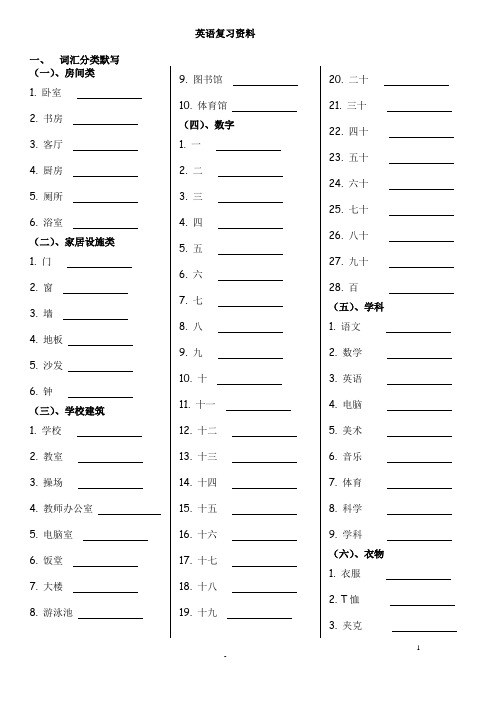
1-英语复习资料一、 词汇分类默写 (一)、房间类 1. 卧室 2. 书房 3. 客厅 4. 厨房 5. 厕所 6. 浴室 (二)、家居设施类 1. 门 2. 窗 3. 墙 4. 地板 5. 沙发 6. 钟 (三)、学校建筑 1. 学校 2. 教室 3. 操场 4. 教师办公室 5. 电脑室 6. 饭堂 7. 大楼 8. 游泳池9. 图书馆 10. 体育馆 (四)、数字 1. 一 2. 二 3. 三 4. 四 5. 五 6. 六 7. 七 8. 八 9. 九 10. 十 11. 十一 12. 十二 13. 十三 14. 十四 15. 十五 16. 十六 17. 十七 18. 十八 19. 十九20. 二十 21. 三十 22. 四十 23. 五十 24. 六十 25. 七十 26. 八十 27. 九十 28. 百 (五)、学科 1. 语文 2. 数学 3. 英语 4. 电脑 5. 美术 6. 音乐 7. 体育 8. 科学 9. 学科 (六)、衣物 1. 衣服 2. T 恤 3. 夹克4. 大衣5. 衬衫6. 连衣裙7. 短裙8. 毛衣9. 女衬衫10. 裤子11. 牛仔裤12. 短裤13. 鞋子14. 袜子15. 帽子(有边)16. 帽子(鸭舌帽)(七)、职业1. 画家2. 医生3. 护士4. 建筑工人5. 警察6. 记者7. 老师8. 厨师9. 农民10. 作家11. 司机12. 职业(八)、形容词1. 大的2. 小的3. 干净的4. 美丽的5. 对的6. 错的(九)、动词1. 画画2. 合上3. 打开4. 喜欢5. 居住6. 看7. 读,阅读8. 做9. 种10. 工作11. 吃12. 看见,明白13. 写14. 学习15. 唱歌16. 了解,懂得17. 拿,取,要了18. 帮助19. 告诉20. 制造21. 驾驶22. 建筑(十)、短语1. 上课2. 用餐3. 淋浴4. 看电视5. 做家庭作业6. 读书7. .种花8. 写故事9. 用数字10. 画画11. 唱歌12. 做运动13. 了解世界14. 买衣服15. 建房子16. 帮助病人17. 获得新闻18. 讲故事19. 开公共汽车20. 种植粮食21. 制造机器22. 爱学习复习M1、M2 重点词组:purple flowers 紫色的花on the wall 墙上white dogs 白色的狗two brown cats 两只咖啡色的猫next to……在……旁边a small desk 一张小书桌next to the computer 在电脑旁边between two windows 两个窗户之间behind the door 门背后a new computer 一台新电脑play a game 玩个游戏look at…看着……a clock on the wall 墙上一面钟a rabbit in the box 盒子里一只兔子some flowers on the window窗台上一些花a car on the floor 地板上一辆小汽车a car under the chair椅子下一辆小汽车two cats behind the door 门后两只猫Welcome to ……欢迎来到……Oh it’s nice. 很好。
广州小学英语总复习及习题

广州小学英语总复习及习题六年级复习一,名词的数和所有格1、 名词分为:可数名词,不可数名词。
2、 可数名词复数规则1.一般情况下,直接加-s,如:book-books, bag-bags, cat-cats, bed-beds2.以s. x. sh. ch结尾,加-es,如:bus-buses, box-boxes, brush-brushes,watch-watches3.以“辅音字母+y”结尾,变y为i, 再加-es,如:family-families, strawberry-strawberries4.以“f或fe”结尾,变f或fe为v, 再加-es,如:knife-kniveshalf-halves(一半)(thief ,wife ,life ,shelf ,knife ,leaf ,self ,half ,wolf)注意①有少数词后直接加s,如roof-roofs (屋顶)5.不规则名词复数:man-men, woman-women, policeman-policemen, policewoman-policewomen,mouse-mice, child-children, foot-feet, .tooth-teeth deer—deer goose—geesefish-fish, people-people, Chinese-Chinese, Japanese-Japanese 6、不可数名词的量有以下两种表示方法:1) some, much ,a little ,a lot of ,a bit of , plenty of 用等表示多少。
注意既可以与可数名词复数,又可以与不可数名词连用的有:plenty of ,some ,a lot of ,lots of ,most of 等。
如there is much water in the bottle .瓶中有很多水。
I’ll tell you much good news.我要告诉你许多好消息。
广州版六年级英语复习资料.doc
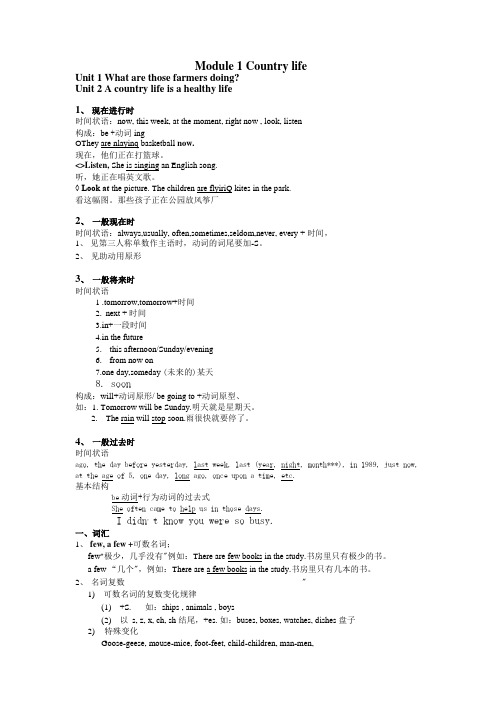
Module 1 Country lifeUnit 1 What are those farmers doing?Unit 2 A country life is a healthy life1、现在进行时时间状语:now, this week, at the moment, right now , look, listen构成:be +动词ingOThey are nlayinq basketball now.现在,他们正在打篮球。
<>Listen, She is singing an English song.听,她正在唱英文歌。
◊ Look at the picture. The children are flyiriQ kites in the park.看这幅图。
那些孩子正在公园放风筝厂2、一般现在时时间状语:always,usually, often,sometimes,seldom,never, every + 时间,1、见第三人称单数作主语时,动词的词尾要加-S。
2、见助动用原形3、一般将来时时间状语1 .tomorrow,tomorrow+时间2.next + 时间3.in+一段时间4.in the future5.this afternoon/Sunday/evening6.from now on7.one day,someday (未来的)某天8. soon构成:will+动词原形/ be going to +动词原型、如:1. Tomorrow will be Sunday.明天就是星期天。
2.The rain will stop soon.雨很快就要停了。
4、一般过去时时间状语ago, the day before yesterday, last week, last (year, night, month***), in 1989, just now, at the age of 5, one day, long ago, once upon a time, etc.基本结构be动词+行为动词的过去式She often came to help us in those days.I didn,t know you were so busy.一、词汇1、few, a few +可数名词;few"极少,几乎没有"例如:There are few books in the study.书房里只有极少的书。
- 1、下载文档前请自行甄别文档内容的完整性,平台不提供额外的编辑、内容补充、找答案等附加服务。
- 2、"仅部分预览"的文档,不可在线预览部分如存在完整性等问题,可反馈申请退款(可完整预览的文档不适用该条件!)。
- 3、如文档侵犯您的权益,请联系客服反馈,我们会尽快为您处理(人工客服工作时间:9:00-18:30)。
小学英语毕业总复习语法归纳99一.名词与量词一.不可数名词:部分为液体类,气体类的物质单词(没有复数形式)液体:tea coffee juice Coke milk water soup气体:air gas肉类:chicken(表“鸡肉”时为不可数名词,表“小鸡”时为可数名词)fish (表“鱼肉”时为不可数名词,表“鱼”时为可数名词) pork beef meat 总称:food fruit其它:rain wind snow lightpizza pasta salad bread toast porridge rice chocolate ice-creambroccoligrass(小草)money paper二.名词复数形式:1. +s2. o(有生命), x, s, sh, ch +es3. 辅音加y结尾,改y为i+es4. 改fe 或f 为v+es5. 单复数同形fish sheep deer people family(作为“家人”解释时) Chinese Japanese6. 特殊man –men fireman–firemen policeman-policemen postman- postmensnowman-snowmenwoman –women policewoman – policewomengoose – geese foot –feet tooth – teeth ox- oxen child –children mouse-mice三.名词的所有格1.一般情况,在名词的末尾加 ’s (the boy’s bag )2.以s结尾的复数名词末尾加 ’ ( the boys’ books )3. 表示几个人共同拥有的东西,只在最后一个名字后加 ’s如:Tom and Ben’s bedroom (汤姆与本共同拥有的卧室)4. 分别拥有的东西就在每个名字后各自加 ’s如:Tom’s bedroom and Ben’s bedroom(汤姆的卧室和本的卧室)5. 没有生命的东西的所有格通常用 “ …of + 名词”的方法来表示。
如:the cover of the book (书的封面)注:姓氏的复数形式前面加the 表示“ …一家人”如:the Whites (怀特一家人)姓或名字后加所有格有时可以表示地点。
如: Let’s eat at Jimmy’s (我们去Jimmy 餐厅吃饭吧。
)I’m going to Miss Lin’s . (我准备去林老师家。
)四.量词1. a plate of (一盘…) 7. a bowl of ( 一碗…)2. a piece of (一片/ 张…) 8. a bag of ( 一袋…)3. a pair of ( 一对/ 双…) 9. a box of (一箱…)4. a cup of ( 一茶杯…)5. a glass of ( 一玻璃杯…)6. a bottle of ( 一瓶…)注:量词的后面 + 不可数名词(单数) / 可数名词(复数)如:a bag of rice a bag of apples当量词数量超过一时,量词也要跟着用复数形式。
如:two glass es of some bottle s of二 .形容词与副词(一)单音节及部分双音节单词的形容词及副词比较级与最高级变化规律:1.直接+er / est2.以e结尾+ r/st3.重读闭音节单词(通常以辅元辅结尾)双写末尾字母+er / est (如:wetter , hotter ,fatter)4.辅音加y结尾改y为i+er / est5.特殊(不规则)(二)双音节(部分)与多音节单词形容词、副词比较级与最高级变化规律:比较级最高级more+原形 most+原形(三)修饰比较级的词:mucha little + 比较级a lot(四)表示 “越来越…”bigger and bigger happier and happier more and more less and leesmore and more slowly more and more beautiful more and more boring(五)不规则的形容词词、副词比较级与最高级:• well better best• good better best• many more most• bad worse worst• far farther farthest• little less least(六)部分双音节形容词、副词的比较级与最高级:• slowly more slowly most slowly• crowded more crowded most crowded• famous more famous most famous• quickly more quickly most quickly• patient more patient most patient• excited more excited most excited• boring more boring most boring(七)其他1.形容词修饰名词,常放在名词前。
(a beautiful girl )2.副词修饰动词, 常放在动词后面。
(run fast)3.两者之间用比较级,三者或三者以上通常用最高级。
如:Who can run faster, Ben or Tom?Who can run fastest, Ben, Tom, or Yongxian?4.比较级的句子通常有标志词 “than”。
5. 最高级的句子通常有标志词“the”(形容词最高级才有,副词没有),表范围限制的介词“ in、 on、 of ”。
如:She is the prettiest of the three. ( 她是三个人当中最漂亮的。
)Elephants are the biggest animals on land.He runs most slowly in his class. ( 副词的最高级前面没有“the”)3.介词与连词(1)介词1.表时间:at:在几点on:在某一天in:在某个月、季节、学期、年from…to…:从…到….for:做事情做了多长时间,持续多久during:在…期间2. 表方位:in, on, beside, under, behind, in front of, near, between,opposite, against里面上面旁边下面后面前面附近两者之间对面靠着3. 表地点:at :在… (后面加小的地点) (at school , at the library)in:在… (后面加大的地点) (i n China, in Guangzhou)4. 介词短语1. leave for离开到…9. in the morning /afternoon / evening 在上午/ 下午/ 晚上10. at noon / night 在中午 / 夜晚11. close to / next to 靠近…12. on the left / right 在左边 / 右边13. from the left / right 从左边 / 右边14. ask for … 索取…15. wait for… 等待…16. on the farm在农场上2. start for 出发到…3. look for寻找…4. agree with同意…5. catch up with 赶上…6. help sb. with 帮某人某事7. help yourself to随便吃..8. get to 到达…(2)连词and :和(并列关系)or:或者(选择关系)but:但是(转折关系)when: 当…then:然后before: 在…之前after:在…之后because:因为so:所以if:假如四.代词、冠词与数词(一)代词人称代词我你他她它我们它/她/他们主格 I you he she it we they 宾格 me you him her it us them物主代词我的你的他的她的它的我们的它/他/她们的形容词性 my your his her its our名词性mine yours his hers its ours theirs1. 人称代词主格:一般在句子中做主语,放在动词前面。
(疑问句则放在动词后面)如:She and I are good friends .Is she a clever girl?宾格:一般在句子中做宾语,放在动词或介词后面。
如:Give me a book.I am waiting for him.2. 物主代词形容词性物主代词:修饰名词,放在名词前面。
(如:my book , their teacher )名词性物主代词:后面不能加名词,可单独使用,常放在句子末尾或动词前面。
如:Your book is better than mine.My book is interesting. Hers is boring. ( hers 在这里意思为 her book)(二) 冠词1. 不定冠词a 、an1) 表示一类人或事物,不具体指哪一个。
如:She is a teacher.2) 表示数量“一”。
如:I have a cat and two rabbits.3)用在固定搭配里。
如:a lot of , a little , have a cold, take a rest4) 元音发音开头的单词用“an” ,辅音发音开头的单词用“a”。
(一般情况以a, e , i o, u结尾的单词用“an”)如: an egg, an English teacher , an apple2.定冠词 the1)特指某个具体的人或事物。
(如:The book on the table is mine.)2)已经提过的人或事物。
(如:I have a cat. The cat is lovely.)3)用在序数词、形容词最高级的前面。
(I live on the third floor .Guangzhou is the best city.)4)用在世界独一无二的事物前。
(the sun, the moon, the earth )5)用在乐器前。
(play the guitar , play the piano)6)(三)数词1. 基数词:表数量(one ,two ,three …)2. 序数词:表顺序( first, second, third….)一、二、三特殊记,first, second, third.八去t ,九去e,ve要用f 替。
